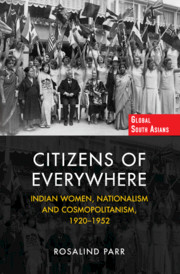Book contents
- Frontmatter
- Dedication
- Contents
- List of Figures
- Acknowledgements
- Note on Spelling
- List of Abbreviations
- Introduction: Cosmopolitanism, Nationalism and the Global Public Sphere
- 1 The Cosmopolitan-Nationalism of Sarojini Naidu
- 2 Suffrage; Solidarity
- 3 Becoming Global Citizens
- 4 Breaking America
- 5 A Changing World Order?
- 6 Defining Human Rights
- Conclusion
- Appendix 1 Dramatis Personae
- Appendix 2 The Universal Declaration of Human Rights
- Bibliography
- Index
Conclusion
Published online by Cambridge University Press: 06 August 2021
- Frontmatter
- Dedication
- Contents
- List of Figures
- Acknowledgements
- Note on Spelling
- List of Abbreviations
- Introduction: Cosmopolitanism, Nationalism and the Global Public Sphere
- 1 The Cosmopolitan-Nationalism of Sarojini Naidu
- 2 Suffrage; Solidarity
- 3 Becoming Global Citizens
- 4 Breaking America
- 5 A Changing World Order?
- 6 Defining Human Rights
- Conclusion
- Appendix 1 Dramatis Personae
- Appendix 2 The Universal Declaration of Human Rights
- Bibliography
- Index
Summary
Today on Avenue de la Paix, not far from the Palais des Nations in Geneva, stands a statue of Mohandas K. Gandhi. In recent times, statues of Gandhi in Africa have attracted controversy. But not this one. Here in the genteel surroundings of Ariana Park, the Mahatma sits undisturbed, back turned to the vast complex that is the European office of the United Nations, studying a book. The Geneva Gandhi is the Gandhi of quiet contemplation; his untroubled demeanour suggests his whole-hearted sanction of the bastion of international cooperation behind him. ‘The world is in good hands,’ the personification of peace and non-violence seems to say.
The Gandhi statue was gifted to the City of Geneva by the Government of India in 2007 and there can be no mistaking the joint claim made by its placement on Avenue de la Paix. Here, by mutual association, India (through Gandhi) and Geneva (through its history of internationalism) are made to represent the human quest for peace. Yet the real-life Gandhi visited the city only once, at the time of the World Disarmament Conference in December 1931, when he delivered a brief message on non-violence at Victoria Hall. Generally, he was critical of the League of Nations and did not engage with it in any meaningful sense. While, indisputably, Gandhi's legacy is global (albeit contested), the historical link here is tenuous. As with most statues, the Geneva Gandhi more reflects the perspectives of those responsible for it than informs us about the past.
The visibility of Gandhi in the home of interwar internationalism contrasts with the less conspicuous presence of his female colleagues, symbolising a more general marginalisation of the role played by women in the movement for Indian independence. While Gandhi is commemorated with a prominent statue, the considerably more active engagement of women with Geneva, and the global public sphere in general, is buried in the archives or in scattered accounts. This book is an attempt to understand and bring meaning to these neglected activities.
Shining a light on women's international activism establishes anti-colonial women as autonomous historical figures who made distinct contributions to the movement for independence. It is common practice to view such women through the prism of their relationships with male colleagues, which invariably casts them in supporting roles.
- Type
- Chapter
- Information
- Citizens of EverywhereIndian Women, Nationalism and Cosmopolitanism, 1920–1952, pp. 153 - 159Publisher: Cambridge University PressPrint publication year: 2021

